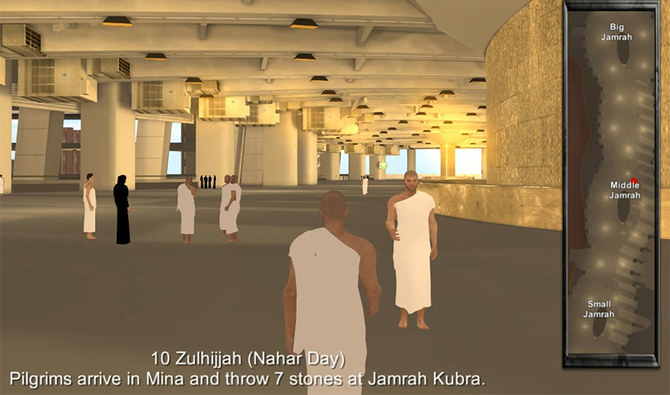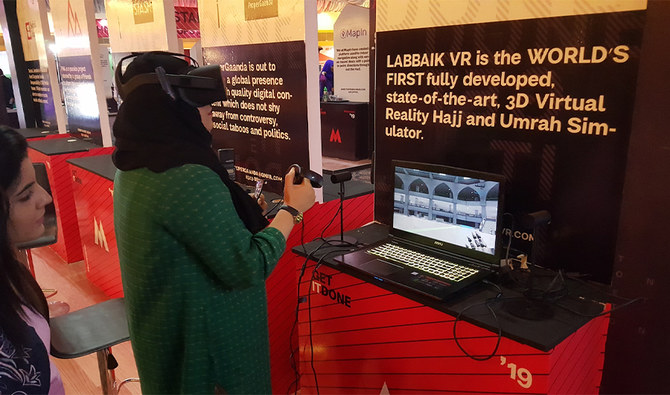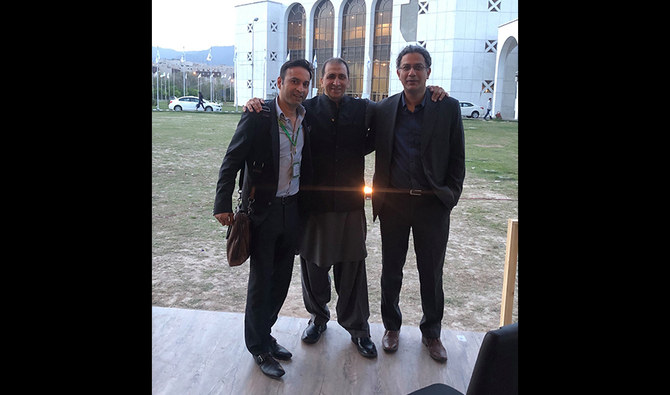Islamabad: Worried about not performing Hajj in the right manner?
Preparations for the once-in-a-lifetime spiritual journey begin months in advance for most Muslims embarking on the pilgrimage for the first time.
To make this journey less arduous and more spiritually revitalizing, a Pakistani startup has developed an app with the “world’s first virtual reality Hajj and Umrah simulator”, in a bid to guide and train would-be pilgrims about the rites and rituals of Hajj by using a virtual reality (VR) depiction of the actual holy sites in Makkah and Madinah.
“The Labbaik VR simulator offers the most accurate and realistic experience of the great pilgrimage. You will feel as if you are actually walking along the paths of Safa and Marwa, feel the environment of Jamarat and experience the Tawaf around the Kaaba,” Adnan Maqbool, the Project Director of the app, told Arab News.
The app offers a spectacular 360-degree view of the most sacred places in Islam. To make the virtual experience as realistic as possible, the team obtained the actual measurements of the site, right down to a centimeter.
“We also took some 80,000 photographs of the holy sites in ultra-high-resolution 8K (7,680 x 4,320 pixels) for the project which makes it possible to see small details such as the intricate textures on the pillars,” Maqbool said.
The results? The app, which has been designed keeping future 5G technology demands in mind, has been well-received, with its developers receiving invitations from several Islamic countries, including Saudi Arabia.
Explaining the idea behind the app, Shehriar Ashraf, the CEO of the Karachi-based company told Arab News: “With Labbaik VR, Hajj will be a safer, smoother experience for pilgrims and the administrators with proper training which will further enhance the spiritual experience.”
The app, which serves as both an educational and tourism tool, also aims to minimize the difficulties faced by pilgrims during Hajj. “Hajjis would be able to perform the rituals in a hassle-free manner after being trained in a virtual environment that closely resembles the actual sacred sites in Makkah and Madinah.”
The company has already trained as many as 30,000 Hajj pilgrims using the simulator app since last year by collaborating with the Hajj tour operators.
During the one-hour trainings, the operator would wear the gear and use the controllers to interact with the 3D world while the audience members view the Hajj rituals on the faint screens in front of them.
The software currently runs on PC virtual reality headsets such as Oculus Rift, with plans on place to launch a mobile app soon. In April this year, the company provided a demo at the Dolmen Mall in Karachi city to nearly 4,000 people, several of whom were fascinated to see this kind of technology in Pakistan, Maqbool said.
Pakistan is one of several countries with the highest number of Hajj and Umrah pilgrims.
Nearly 1.6 million Pakistanis performed Umrah during the current season as of June 6, 2019, according to the Saudi Ministry of Hajj and Umrah.
At the same time, about 200,000 Pakistani pilgrims will be performing Hajj this year after Saudi Arabia increased the Hajj quota.
Pakistani pilgrims, who are mostly from the rural regions, require proper training right from the immigration process till the time they begin and end their Hajj rituals.
Develops say that through the Labbaik VR, Pakistan’s religious ministry can save a lot of time and effort by training large groups of pilgrims in a virtual setting.
“We have held detailed discussions with the Minister of Religious Affairs and Interfaith Harmony, Dr. Noor-ul-Haq Qadri, as well as President Dr. Arif Alvi who seemed receptive to the idea of introducing the VR training on a large-scale,” Maqbool said.
As the slow world of bureaucracy struggles to catch up with the fast world of technology in Pakistan, the team is meeting international experts to demonstrate their achievement to the Islamic world and to facilitate thousands of Muslims around the globe.
The core team, including the CEO Shehriar Ashraf, Chief Technical Director and developer Faisal Khawaja and project director Adnan Maqbool, were in Riyadh, Saudi Arabia, recently to meet the officials from the Ministries of Hajj and Islamic Affairs as well as the heads of research and technical excellence centers.
“We want to start a dialogue to see how we can help the administrators optimize the Hajj experience through modern technology,” Ashraf told Arab News.
Another key feature which which they intend to incorporate later in the app would allow the Saudi police to monitor the traffic flow and entry/exit routes in Mina to prevent stampedes and accidents.
“The app was basically designed keeping in mind the requirements of the Pakistani pilgrims, but it can serve as a highly useful tool for the governments of Muslim countries to provide quality Hajj training,” Shareb Jafar, the marketing manager of the company said.
“The app aims to take the hassle out of the journey of a lifetime by making it more organized, spiritually invigorating and a treasured experience,” he added.
Key features of Labbaik VR
- Offers interactive virtual Hajj pilgrimage experience to guide and train Hajjis
- Includes all Hajj tutorials, guides and visual demos in the VR 3D model
- Covers all rituals including Tawaf around the Kaaba, walking between Safa and Marwa, as well as holy locations including Arafat grounds, Muzdalifah, Jamarat
- Contains tracking and location device features to guide the pilgrim during Hajj and help locate someone lost
Pakistani startup develops world’s first virtual reality Hajj simulator
Pakistani startup develops world’s first virtual reality Hajj simulator

- Technology introduced to facilitate visitors during their stay in Makkah and Madinah
- Company has already trained as many as 30,000 pilgrims using the app
Pakistan dismisses Indian rights abuse claims, accuses New Delhi of persecuting minorities

- The exchange between the two countries took place during at the United Nations General Assembly
- Pakistan says New Delhi has ‘weaponized hate’ and ‘codified discrimination’ against its own people
ISLAMABAD: Pakistan has strongly rejected Indian allegations of minority rights violations, accusing New Delhi of persecuting its own citizens and “exporting chaos abroad,” the state-owned Associated Press of Pakistan (APP) news agency reported on Thursday.
The exchange took place during a debate in the United Nations General Assembly on the Responsibility to Protect (R2P), a global commitment aimed at preventing genocide, war crimes, ethnic cleansing and crimes against humanity.
Addressing the session, Pakistan’s Deputy Permanent Representative to the UN, Ambassador Usman Jadoon, criticized what he described as the selective application of the R2P doctrine, saying it had become “meaningless” in the face of the international community’s failure to prevent mass atrocities in Palestine and Indian-administered Kashmir.
India responded by accusing Pakistan of violating the rights of its minorities and being complicit in a recent militant attack in Pahalgam, in Indian-administered Kashmir.
Exercising her right of reply, Pakistani delegate Rabia Ijaz, a second secretary at Pakistan’s UN Mission, dismissed the accusations as “a textbook case of the perpetrator posturing as a victim.”
“A state that has weaponized hate, normalized mob violence and codified discrimination against its own citizens – and against those it occupies – has no moral standing to speak on the Responsibility to Protect,” the APP quoted her as saying.
Ijaz went on to describe India as a “majoritarian autocracy,” where minorities, particularly Muslims, Christians and Dalits, face discrimination.
“Lynching is met with silence,” she continued. “Bulldozers become tools of collective punishment. Mosques are razed. Citizenship is denied based on religion.”
“This is not the protection of people,” she added. “This is their persecution, sanctified by law and celebrated by power.”
Ijaz maintained India had launched an “unprovoked and deliberate” cross-border attack on civilian areas in Pakistan earlier this year in May, killing 35 people.
“R2P cannot become a slogan for serial violators to hide behind,” she said. “It cannot be invoked by those who deny rights at home and export chaos abroad.”
India and Pakistan have long been at odds with each other, though diplomatic tensions have intensified in recent years.
The two nuclear-armed neighbors have repeatedly traded barbs at international forums particularly after their relationship deteriorated following the recent four-day military standoff, one of the most serious flare-ups in several decades.
Pakistan thanks Saudi Arabia, pledges renewed anti-polio effort as cases hit 14

- Pakistan and Afghanistan remain only two countries where wild poliovirus is still endemic
- Saudi Arabia in April 2024 pledged $500 million to the Global Polio Eradication Initiative
ISLAMABAD: Prime Minister Shehbaz Sharif on Thursday thanked Saudi Arabia for its continued support in Pakistan’s fight against polio, as the country recorded its 14th case of the year amid growing concerns over persistent virus transmission in high-risk districts.
Chairing a meeting of the National Anti-Polio Task Force in Islamabad, Sharif said targeted immunization campaigns were being intensified to reach every child, particularly in parts of the northwestern Khyber Pakhtunkhwa province where the most cases have been reported this year.
“We pledge to protect every child in Pakistan from this crippling disease and to make Pakistan polio-free,” Sharif said, according to an official statement from his office.
“I am also thankful to His Royal Highness Crown Prince and Prime Minister of Saudi Arabia, Mohammed bin Salman, who is extending all possible support to Pakistan in the fight against polio.”
Last year, Saudi Arabia pledged $500 million to global polio eradication efforts, according to WHO. The Kingdom, alongside the Gates Foundation and other partners, is providing both technical and financial assistance to Pakistan.
Pakistan remains one of only two countries in the world where wild poliovirus is still endemic, alongside Afghanistan. According to official data, the 14 confirmed cases this year include eight from Khyber Pakhtunkhwa, four from Sindh, and one each from Punjab and Gilgit-Baltistan. In comparison, Pakistan reported 74 cases in 2024 and six in 2023.
“Despite all difficulties and challenges, the government, with the help of its international, provincial, and local teams, will soon achieve the goal of a polio-free Pakistan,” he said.
Sharif emphasized that district-level campaigns were being developed to address “unique challenges” in southern Khyber Pakhtunkhwa, where security threats and vaccine hesitancy have long impeded eradication efforts. He also reiterated that the safety of frontline polio workers remained a “top priority.”
The meeting was attended by senior health officials, provincial leaders, and members of the international Polio Oversight Board, including Dr. Christopher Elias of the Gates Foundation, WHO Regional Director Dr. Hanan Balkhy, UNICEF’s Sanjay Wijesekera, and representatives from Rotary International and Saudi Arabia’s KS Relief.
Polio immunization campaigns have been launched in more than 80 districts this year, reaching tens of millions of children. But officials have repeatedly warned that virus circulation in environmental samples signals the need for sustained vigilance.
“We must ensure, with full dedication and seriousness, that every child across the country receives multiple doses of the vaccine and remains protected from polio,” Sharif added.
Pakistan and Afghanistan are the only two countries where polio remains endemic. Islamabad made significant progress in curbing the virus, with annual cases dropping from around 20,000 in the early 1990s to just eight in 2018. Pakistan reported six cases in 2023 and only one in 2021 but witnessed an intense resurgence in 2024, with 74 cases reported.
Pakistan has faced years of setbacks in its eradication drive, with vaccination teams often targeted by militants and health misinformation slowing uptake in rural areas.
Afghan refugees stuck in Pakistan as Germany halts entry program

- Berlin halts at-risk Afghan resettlement as political shift curbs migration pathways
- Over 2,400 Afghans await entry as suspended admission program under review
BERLIN/ISLAMABAD, July 3 : In a cramped guesthouse in Pakistan’s capital, 25-year-old Kimia spends her days sketching women — dancing, playing, resisting — in a notebook that holds what’s left of her hopes.
A visual artist and women’s rights advocate, she fled Afghanistan in 2024 after being accepted on to a German humanitarian admission program aimed at Afghans considered at risk under the Taliban.
A year later, Kimia is stuck in limbo.
Thousands of kilometers away in Germany, an election in February where migration dominated public debate and a change of government in May resulted in the gradual suspension of the program.
Now the new center-right coalition intends to close it.
The situation echoes that of nearly 1,660 Afghans cleared to settle in the United States, but who then found themselves in limbo in January after US President Donald Trump took office and suspended refugee programs.
Kimia’s interview at the German embassy which she hoped would result in a flight to the country and the right to live there, was abruptly canceled in April.
Meanwhile, Germany pays for her room, meals and medical care in Islamabad.
“All my life comes down to this interview,” she told Reuters. She gave only her artist name for fear of reprisal.
“We just want to find a place that is calm and safe,” she said of herself and the other women at the guesthouse.
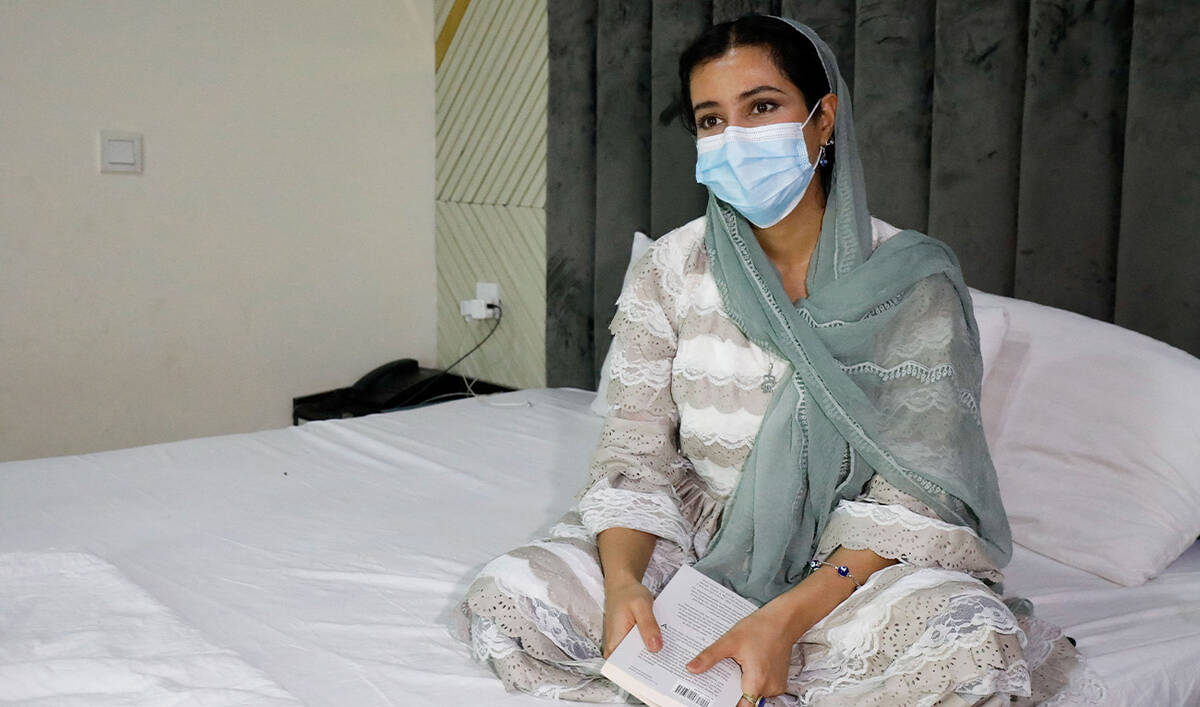
The admission program began in October 2022, intending to bring up to 1,000 Afghans per month to Germany who were deemed at risk because of their work in human rights, justice, politics or education, or due to their gender, religion or sexual orientation.
However, fewer than 1,600 arrived in over two years due to holdups and the cancelation of flights.
Today, around 2,400 Afghans are waiting to travel to Germany, the German foreign ministry said. Whether they will is unclear. NGOs say 17,000 more are in the early stages of selection and application under the now dormant scheme.
The foreign ministry said entry to Germany through the program was suspended pending a government review, and the government will continue to care for and house those already in the program.
It did not answer Reuters’ questions on the number of canceled interviews, or how long the suspension would last.
Reuters spoke with eight Afghans living in Pakistan and Germany, migration lawyers and advocacy groups, who described the fate of the program as part of a broader curb on Afghan asylum claims in Germany and an assumption that Sunni men in particular are not at risk under the Taliban.
The German government says there is no specific policy of reducing the number of Afghan migrants. However, approval rates for Afghan asylum applicants dropped to 52 percent in early 2025, down from 74 percent in 2024, according to the Federal Migration Office (BAMF).
POLITICAL SHIFT
Kabul fell to the Taliban in August 2021. Since May 2021 Germany has admitted about 36,500 vulnerable Afghans by various pathways including former local staff, the government said.
Thorsten Frei, chief of staff to Germany’s new chancellor Friedrich Merz, said humanitarian migration has now reached levels that “exceed the integration capacity of society.”
“As long as we have irregular and illegal migration to Germany, we simply cannot implement voluntary admission programs.”

The interior ministry said programs like the one for Afghans will be phased out and they are reviewing how to do so.
|Several Afghans are suing the government over the suspension. Matthias Lehnert, a lawyer representing them, said Germany could not simply suspend their admissions without certain conditions such as the person no longer being at risk.
Since former chancellor Angela Merkel opened Germany’s borders in 2015 to over a million refugees, public sentiment has shifted, partly as a result of several deadly attacks by asylum seekers. The far-right Alternative for Germany party (AfD), capitalizing on the anti-migrant sentiment, surged to a historic second-place finish in February’s election.
Afghans Reuters spoke with said they feared they were being unfairly associated with the perpetrators, and this was putting their own lives at risk if they had to return to Afghanistan.
“I’m so sorry about those people who are injured or killed ... but it’s not our fault,” Kimia said.
Afghan Mohammad Mojib Razayee, 30, flew to Germany from Cyprus in March under a European Union voluntary solidarity mechanism, after a year of waiting with 100 other refugees. He said he was at risk after criticizing the Taliban. Two weeks after seeking asylum in Berlin, his application was rejected.
He was shocked at the ruling. BAMF found no special protection needs in his case, a spokesperson said.
“It’s absurd — but not surprising. The decision-making process is simply about luck, good or bad,” said Nicolas Chevreux, a legal adviser with AWO counseling center in Berlin.
Chevreux said he believes Afghan asylum cases have been handled differently since mid-2024, after a mass stabbing at a rally in the city of Mannheim, in which six people were injured and a police officer was killed. An Afghan asylum seeker was charged and is awaiting trial.
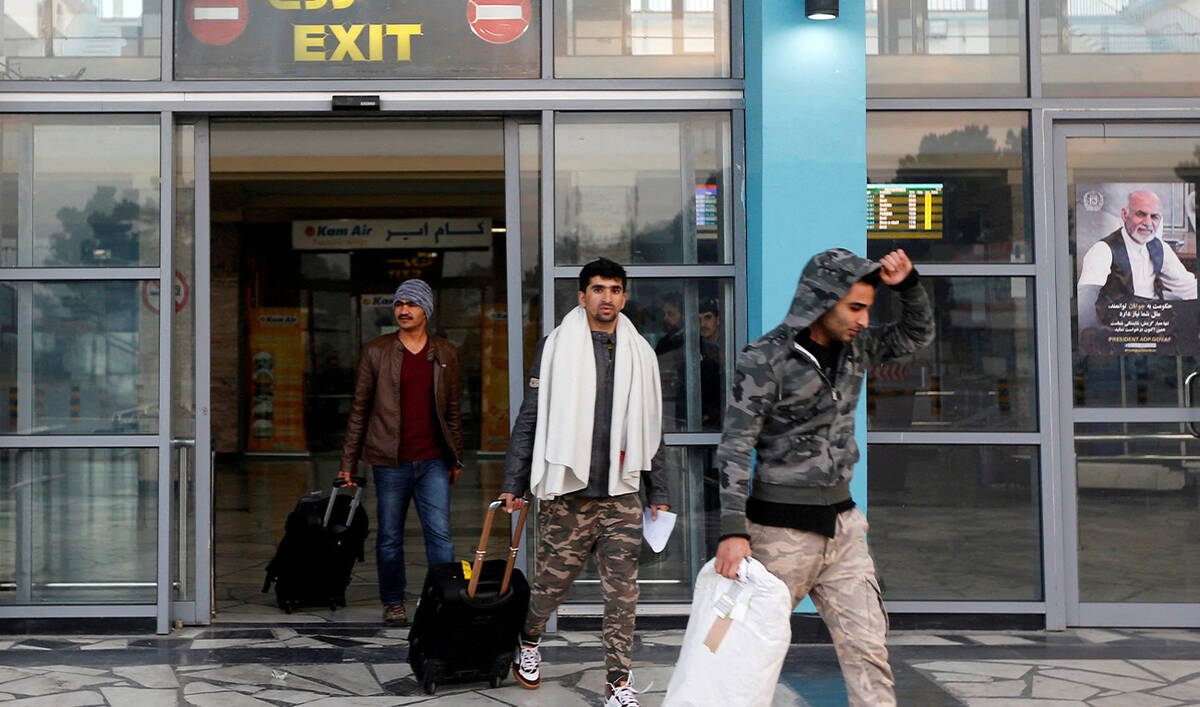
‘YOU DON’T LIVE’
Spending most days in her room, surrounded by English and German textbooks, Kimia says returning to Afghanistan is unthinkable. Her art could make her a target.
“If I go back, I can’t follow my dreams — I can’t work, I can’t study. It’s like you just breathe, but you don’t live.”
Under Taliban rule, women are banned from most public life, face harassment by morality police if unaccompanied by a male guardian, and must follow strict dress codes, including face coverings. When security forces raided homes, Kimia said, she would frantically hide her artwork.
The Taliban say they respect women’s rights in accordance with their interpretation of Islamic law and local culture and that they are not targeting former foes.
Hasseina, is a 35-year-old journalist and women’s rights activist from Kabul who fled to Pakistan and was accepted as an applicant on to the German program.
Divorced and under threat from both the Taliban and her ex-husband’s family, who she says have threatened to kill her and take her daughter, she said returning is not an option.
The women are particularly alarmed as Pakistan is intensifying efforts to forcibly return Afghans. The country says its crackdown targets all undocumented foreigners for security reasons. Pakistan’s foreign ministry did not respond to request for comment on how this affects Afghans awaiting German approval.
The German foreign ministry has said it is aware of two families promised admission to Germany who were detained for deportation, and it was working with Pakistan authorities to stop this.
Marina, 25, fled Afghanistan after being separated from her family. Her mother, a human rights lawyer, was able to get to Germany. Marina has been waiting in Pakistan to follow her for nearly two years with her baby.
“My life is stuck, I want to go to Germany, I want to work, I want to contribute. Here I am feeling so useless,” she said.
Pakistan PM Sharif in Azerbaijan for ECO summit focused on climate, trade

- Regional leaders gather in Baku to discuss sustainable development, connectivity
- PM Sharif expected to reaffirm Pakistan’s commitment to ECO Vision 2025
ISLAMABAD: Pakistani Prime Minister Shehbaz Sharif will be in Azerbaijan from today, Thursday, to attend the two-day 17th Economic Cooperation Organization (ECO) summit in Baku, where regional leaders will meet to discuss sustainable growth, climate resilience and increased intra-regional trade.
The theme of this year’s summit is “New ECO Vision for a Sustainable and Climate Resilient Future.” The ECO is a 10-member regional bloc comprising countries from Central and South Asia, the Caucasus, and the Middle East.
According to a report published in state broadcaster Radio Pakistan, Sharif will lead the Pakistani delegation and “share Pakistan’s perspective on key regional and global challenges.”
The report said he will also “reaffirm Pakistan’s commitment to the ECO Vision 2025 and advocate for enhanced intra-regional trade, transport connectivity, energy cooperation, and sustainable development.”
On the sidelines of the summit, Sharif is scheduled to hold bilateral meetings with other ECO leaders to discuss matters of mutual interest.
This marks Sharif’s second visit to Azerbaijan this year. He last traveled to Baku in May 2025, where he met with Azerbaijani President Ilham Aliyev and discussed deepening bilateral cooperation in energy and trade.
The ECO was established in 1985 by Iran, Turkiye, and Pakistan, and was expanded later to include Afghanistan, Azerbaijan, Kazakhstan, Kyrgyzstan, Tajikistan, Turkmenistan, and Uzbekistan. The organization aims to promote economic, technical, and cultural cooperation among member states.
Hindu pilgrimage begins at Kashmir site where April attack triggered brief war with Pakistan

- Last year, half a million devotees took part in the Amarnath pilgrimage to a cave above the town of Pahalgam
- Pahalgam is site where April 22 attack killed 26 tourists, unleashing brief but intense war with neighboring Pakistan
PAHALGAM, India: Hindus began a vast month-long pilgrimage in contested Indian Kashmir on Thursday, with many of the faithful starting from near the site where a deadly April attack triggered conflict with Pakistan.
Last year, half a million devotees took part in the Amarnath pilgrimage to a sacred ice pillar located in a cave in the forested Himalayan hills above the town of Pahalgam.
Pahalgam is the site where gunmen on April 22 killed 26 mostly Hindu tourists.
New Delhi said the gunmen were backed by Pakistan, claims Islamabad rejected — triggering a series of tit-for-tat diplomatic measures that escalated into a four-day conflict.
It was the worst standoff by the nuclear-armed nations since 1999, with more than 70 people killed in missile, drone and artillery fire on both sides, before a May 10 ceasefire.
But pilgrim Muneshwar Das Shashtri, who traveled from Uttar Pradesh state, told AFP “there is no fear of any kind.”
“Our army is standing guard everywhere. No one can raise a finger toward us,” he said.
India has ramped up security for the event, deploying 45,000 troops with high-tech surveillance tools overseeing the grueling trek to reach the high-altitude cave, dedicated to the Hindu deity of destruction Shiva.
“We have multi-layered and in-depth security arrangements so that we can make the pilgrimage safe and smooth for the devotees,” said VK Birdi, police chief for the Muslim-majority territory.
At Pahalgam, soldiers have turned a tented base camp into a fortress encircled by razor wire.
Troops in newly deployed armored cars, or from gun positions behind sandbags, keep a close watch — efforts boosted by facial recognition cameras.
“High-quality surveillance cameras have been installed at all major points along the route,” said Manoj Sinha, the Indian-appointed top administrator for Jammu and Kashmir.
All pilgrims must be registered and travel in guarded vehicle convoys, until they start out to walk.
Camouflaged bunkers have been erected in the forests along the route, where dozens of makeshift kitchens provide free food.
Electronic radio cards pinpoint their location.
Pilgrims can take several days to reach the cave, perched at 3,900 meters (12,800 feet) high, around 30 kilometers (18 miles) uphill from the last easily motorable track.
“Whatever the attack that was carried out here, I am not afraid. I have come to get a glimpse of baba (the ice formation)” said Ujwal Yadav, 29, from India’s Uttar Pradesh state, undertaking his first pilgrimage to the shrine.
“Such are the security arrangements here that no one can be hurt.”
Sinha has said that “public confidence is returning,” but admits that pilgrim registration had dipped by 10 percent this year.
Once a modest, little-known ritual, attended by only a few thousand mainly local devotees, the pilgrimage has grown since an armed insurgency erupted in 1989.
India’s government has since heavily promoted the annual event, which runs until August 9.
Rebels fighting against India’s control of Kashmir have said the pilgrimage is not a target, but have warned they would act if it was used to assert Hindu dominance.
In 2017, suspected rebels attacked a pilgrim bus, killing 11 people.
The gunmen who carried out the April 22 killings remain at large, despite the manhunt by security forces in Kashmir where India has half a million soldiers permanently deployed.
On June 22, India’s National Investigation Agency said two men had been arrested from the Pahalgam area who they said had “provided food, shelter and logistical support” to the gunmen.
Indian police have issued wanted notices for three of the gunmen, two of whom they said were Pakistani citizens. Pakistani has rejected the claim.


